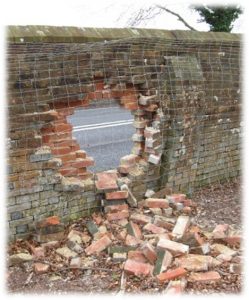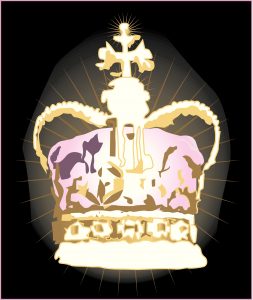GENESIS 48: ABRAHAM’S LAST WILL AND TESTAMENT
Every day, I try to give you a nugget—a breadcrumb—to take away as “food for thought”. So, while navigating some of the more serious topics in life—such as the idea of leaving behind a Will —I’m hoping that my thoughts, here on this website, may help you implement small changes, or add a new puzzle piece to the picture you’re building up of LIFE with your Maker. Today, I’m hoping that you’ll look at a bigger picture where perhaps a black hole used to be.
—I’m hoping that my thoughts, here on this website, may help you implement small changes, or add a new puzzle piece to the picture you’re building up of LIFE with your Maker. Today, I’m hoping that you’ll look at a bigger picture where perhaps a black hole used to be.
When our late son, Michael, was in Year 3 at primary school, his teachers discovered that he was falling behind in his education. He failed his Year 2 Standard Attainment Tests (SATs) and, by the time he started his final year of primary school, he was predicted to fail his Year 6 SATs. I didn’t want him entering secondary school with that hanging over his head. So, we moved him into a small Christian school in a village out of town. After putting him through some entrance tests, they found that he had gaps in his understanding right back to Year 2!
 When explaining it to us, they said that education was like building a brick wall. If you have holes in the wall, early on in its construction, you’ll have problems later—especially when trying to build above the holes. Using an American system, they took our Michael back to Year Two and, during the next twelve months, they gradually repaired the holes in his understanding from Year Two right through to Year Six. By the following year, Mike was multiplying thousands by thousands, without a calculator, and sitting tests on oceanography and volcanology.
When explaining it to us, they said that education was like building a brick wall. If you have holes in the wall, early on in its construction, you’ll have problems later—especially when trying to build above the holes. Using an American system, they took our Michael back to Year Two and, during the next twelve months, they gradually repaired the holes in his understanding from Year Two right through to Year Six. By the following year, Mike was multiplying thousands by thousands, without a calculator, and sitting tests on oceanography and volcanology.
The same scenario is true for our understanding of the Creator God. Until we go back to the beginning and repair the holes in our understanding, we’re likely to run into problems when trying to build up a solid Faith later. There’ll always be gaping holes in our understanding of who our Maker is; what He’s like; what He’s up to in this world; and how He’s likely to think while He interacts on a daily basis, with His image-bearers: those He created in His own image to be like Him.[a]
People with gaps in their understanding, are likely to gloss over today’s chapter as a boring chapter related to a  family who have no connection at all with 21st Century humanity. In reality, this chapter has to be one of the most significant chapters in the Creator’s epic storyline so far. Far from being worthless information, it links the three world religions who today, claim to believe in the Creator God. Specifically, it links back to the issue of all issues: who can lay claim to the inheritance of a working relationship with the Creator God, and what (if anything) would He have in mind for the world He created.
family who have no connection at all with 21st Century humanity. In reality, this chapter has to be one of the most significant chapters in the Creator’s epic storyline so far. Far from being worthless information, it links the three world religions who today, claim to believe in the Creator God. Specifically, it links back to the issue of all issues: who can lay claim to the inheritance of a working relationship with the Creator God, and what (if anything) would He have in mind for the world He created.
Upon hearing, in today’s chapter, that Jacob (Abraham’s grandson) is ill, Joseph pulls his boys out of school and heads for Jacob’s bedside. [v1] Make no mistake, this is a very serious moment where the family inheritance is handed down. One could say that it’s on a par with Queen Elizabeth I, nearing her death without a named successor! On her deathbed, she declared that James VII, King of Scotland, was to inherit her throne—thus making it what it is today: The United Kingdom.
The top subject on Jacob’s mind isn’t his assets and who’s going to get his possessions. The Abrahamic Blessing is the family treasure, and it’s the only thing worth talking about. [v2-4] This is the blessing that the Creator God Himself has repeated five times to Abraham, to Isaac and then to Jacob.[b] It’s a global blessing that no-one, anywhere, has ever heard of, outside of what’s been documented by this family.
 There’s belongings, there’s assets and possessions, and then there’s the crown jewels. This isn’t just about a family blessing. It isn’t even about inheriting land or the future of a people group. This is about the Creator God’s blessing on the nations and, it’s the same inheritance that Isaac trembled violently over (and Jacob’s brother, Esau, wept bitterly over) when they realized that Jacob had been given everything worth having from the Creator God’s hand![c] Jacob got the lot a generation earlier, and now he’s dying. What’s he going to do?
There’s belongings, there’s assets and possessions, and then there’s the crown jewels. This isn’t just about a family blessing. It isn’t even about inheriting land or the future of a people group. This is about the Creator God’s blessing on the nations and, it’s the same inheritance that Isaac trembled violently over (and Jacob’s brother, Esau, wept bitterly over) when they realized that Jacob had been given everything worth having from the Creator God’s hand![c] Jacob got the lot a generation earlier, and now he’s dying. What’s he going to do?
 First, Jacob adopts Joseph’s sons so that they’ll be numbered among the Twelve Tribes of Israel. [v5-6] Then, significantly, he lays his hands on them and blesses them. [v9] Joseph knew the absolute importance in this, so he made sure the oldest was brought towards Jacob’s right hand. [v13] And, several gemstones need to be pocketed away from this part of the script…
First, Jacob adopts Joseph’s sons so that they’ll be numbered among the Twelve Tribes of Israel. [v5-6] Then, significantly, he lays his hands on them and blesses them. [v9] Joseph knew the absolute importance in this, so he made sure the oldest was brought towards Jacob’s right hand. [v13] And, several gemstones need to be pocketed away from this part of the script…
Nothing recorded in this epic play is random or meaningless information. Everything is hugely significant, as these multifaceted puzzle pieces (no matter how small) come together in an incredibly complex Master Plan. For one thing, Jacob seems to randomly mention the burial place of his wife, Rachel. [v7] This seems out of context since Joseph would have known where his mother was buried. But Ephrath (that is Bethlehem) becomes important later, not least of all with Jeremiah’s prophecy:
“This is what the Lord says: ‘A voice is heard in Ramah, mourning and great weeping, Rachel weeping for her children and refusing to be comforted, because they are no more.’” [Jeremiah 31:15]
The significance of this came in the First Christmas Story when Matthew linked it to King Herold of Israel, murdering all the little boys of Bethlehem (Rachel’s descendants) in a bid to kill baby Jesus.[d] In addition to this gemstone, that makes for a great read as hundreds of threads are carefully woven together over the next centuries, there are gemstones to be found in the blessing itself.
First, the ancient Abrahamic Blessing passed down now from Jacob’s right hand (the “right hand of blessing”) originates, or is achieved by, two people: The Creator God and His mysterious right-hand man—currently known as “The Lord’s Angel”—and yet the two are one:
“May the God before whom my fathers walked…the God who has been my shepherd… the Angel who has delivered me…may He bless these boys…” [v16]
Israel blessed them in the name of the Creator God and of the Angel (notice the capital letter) who had delivered him from harm—his personal saviour. [v15-16] Hugely important is the fact that Jacob is blessing in the name of two people: the Creator and someone else, who has appeared on stage in the size and shape of a man, three times now[e] and, who’s simply known at this stage as “the Angel” yet the two are One: “…may HE bless these boys…” Then there’s the content…
“…Your descendants will be like the dust of the earth, and you will spread out to the west and to the east, to the north and to the south. All peoples on earth will be blessed through you and your offspring…” [Genesis 28:14]
When Israel unexpectedly crossed his arms to place his right hand on Ephraim’s head, it was absolutely critical to the storyline. [v14] Joseph tried to get Jacob to change the “first recipient” to his firstborn who’s name means “forget”.[f] But, against culture and protocol, Jacob is adamant that “Fruitfulness”[g] is to have the right hand of blessing on him, and that he’ll become a group of nations. [v19] So the blessing has two clues: (i) Father God chose the one called “Fruitfulness”; and (ii) being “Twice Fruitful” a table of blessed nations to come.
The gemstone of Ephraim needs to be pocketed away as someone to remember, as this epic Play continues. To accomplish this global plan of having children in the west, east, north and south so that all nations on earth will be blessed, Father God’s plan will be “twice fruitful in the land of HIS suffering” and that second level of fruitfulness will spread out to encompass a group of nations.[h] To make sure that this remains permanently noticed, Jacob gave Ephraim the ridge of land, in the land of Israel, where “Twice Fruitful”—with his international mandate—would be easily visible in the middle of all his brothers. [v20-22]
Now Abraham’s Last Will and Testament, handed down to the forth generation (yet argued to be meaningless and so far removed from life on Planet Earth today), is swiftly becoming an inheritance worth talking about. It’s certainly the makings of a song worth singing…
CLICK to return to today’s “Daily Breadcrumbs”
[a] Genesis 1:26-28
[b] Genesis 12:3; 18:18; 22:18; 26:4; 28:14 and Acts 3:25
[c] Genesis 27:27-29&33-41
[d] Matthew 2:18
[e] Genesis 16:7-14;c18 and 32:22-32
[f] Genesis 41:51
[g] Genesis 41:52
[h] Matthew 8:11